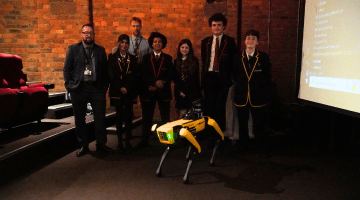Course modules
What you will study on this degree
Further guidance on modules
Modules are designated core or optional in accordance with professional body requirements, as applicable, and LJMU’s Academic Framework Regulations. Whilst you are required to study core modules, optional modules provide you with an element of choice. Their availability may vary and will be subject to meeting minimum student numbers.
Where changes to modules are necessary these will be communicated as appropriate.
Core modules
Project Study
20 credits
20 credits
Foundation Mathematics for Engineering and Technology 1
20 credits
20 credits
Foundation Mathematics for Engineering and Technology 2
20 credits
20 credits
Introductory Foundation Physics
20 credits
20 credits
Academic English Skills 1
20 credits
20 credits
Academic English Skills 2
20 credits
20 credits
Core modules
Engineering Mathematics 1a
10 credits
10 credits
This module provides a foundation in engineering mathematics for its application to the solution of engineering problems.
Engineering Mathematics 1b
10 credits
10 credits
This module provides a foundation in engineering mathematics for its application to the solution of engineering problems. It is a continuation of Engineering Mathematics 1a.
Applied Mechanics 1
20 credits
20 credits
This module aims to introduce you to the essential principles of applied mechanics.
Thermodynamics and Fluid Mechanics 1
20 credits
20 credits
The module aims to introduce the essential principles of thermodynamics and fluid mechanics.
Materials
20 credits
20 credits
The module aims to introduce you to the essential principles of material science and engineering with reference to an essential element in mechanical design and materials selection. This module will also provide technical insight into various manufacturing processes. The overall module aim is to enable you to gain knowledge and skills for further studies or employment.
Engineering Practice
20 credits
20 credits
This module aims to introduce you to a range of general engineering practices and standards.
Mechatronics 1
20 credits
20 credits
The aim of this module is to introduce electromechanical systems focusing on applications in the areas of Mechanical, Automotive and Marine Engineering. The module covers the essential concepts of electrical circuits including AC and DC systems, signals, sensors, actuators and digital electronics.
Core modules
Materials and Processes
10 credits
10 credits
Thermodynamics and Fluid Mechanics 2
20 credits
20 credits
This module provides you with an insight into thermal plant cycles and the physical behaviour of fluid flow and heat transfer by application of the theory to practical engineering examples.
Engineering Design 2
20 credits
20 credits
This module aims to build on the skills developed in the Level 4 Engineering Practice module by introducing systematic approaches to the design process and to the analysis of mechanical engineering designs. It will provide you with a practical experience of the design process, allow you to further practice the analytical skills relating to mechanics and to document your work to appropriate design standards.
Mechatronics 2
20 credits
20 credits
This module helps to develop a practical understanding of how sensors and actuators may be used along with embedded systems to control and monitor mechanical engineering systems.
Engineering Mathematics 2
20 credits
20 credits
This module will provide you with a further course in engineering mathematics and its application to the solution of engineering problems.
Modelling and Simulation
10 credits
10 credits
This module aims to introduce methods for modelling and simulating engineering systems. You will learn how to create models (typically 1-D) which may be represented using software, parameterized and simulated to create results which allow you to explore their behaviour.
Core modules
Engineering Project
40 credits
40 credits
Engineering Design 3
20 credits
20 credits
This module will deliver a project based learning experience in Engineering Design. It is intended to present a practical focal point for knowledge and techniques learned in other modules as well as to continue to build on the engineering design curriculum. It will help you follow a systematic approach to generate detailed designs addressing both component and system level requirements.
Industrial Management
20 credits
20 credits
This module is designed to develop the core management techniques required to assess the economic viability of a product/project and to design and implement a plan to deliver it.
Optional Modules
Fluid Dynamics and Heat Transfer
10 credits
10 credits
The module aims to further develop your knowledge on the essential principles of Fluid Dynamics and Heat Transfer.
Thermodynamics
10 credits
10 credits
The module aims to provide you with a comprehensive insight into power generation at an advanced level by studying the performance and behaviour of thermodynamic systems for evaluation of industrial plant applications.
Structural Integrity
10 credits
10 credits
This module enables you to develop an understanding of the performance of materials and structures subjected to load in terms of deformation based failure, fracture and fatigue.
Manufacturing Systems
10 credits
10 credits
This module will deliver a broad course in manufacturing systems, and cover policy and logistical considerations that drive process solutions. It will enable you to work on manufacturing systems and assembly problems and cultivate a deep understanding of the systematic practice for current challenges in a modern manufacturing environment.
Dynamics and Control
10 credits
10 credits
The module aims to develop your knowledge and experience of analytic and simulative methods applied to modelling and control design of open loop and closed loop engineering systems.
Materials Engineering
10 credits
10 credits
This module provides you with an in-depth understanding of advanced engineering materials together with techniques for material property and performance improvements.
Computational Fluid Dynamics
10 credits
10 credits
The module will introduce you to Computational Fluid Dynamics (CFD) and will extend your experience, knowledge and skill with the aid of industry standard software.
Sensors and Robotics
10 credits
10 credits
This module aims to provide a comprehensive overview of possible deployment of sensor payloads for a variety of sensing applications. This will include a variety of imaging and inspection techniques enabled by robotic systems.
Finite Element Analysis
10 credits
10 credits
This module acts as a point of introduction to Finite Element theory using relevant software to carry out Finite Element studies.
Course tutors
-
 Lecturer/Senior Lecturer
Lecturer/Senior Lecturer
Tuition fees and funding
Entry requirements
Please choose your qualifications below to view requirements
Grades/points required from qualifications:
Work out how many UCAS points your qualifications are worth by visiting the UCAS Tariff Calculator.
International requirements
Other international requirements
Entry of level-3: Qualification: A score of 60% or above in Al Thanawiyya al Amma (Qatari curriculum High School exam conducted by the Ministry of Education and Higher Education in Qatar), or equivalent high school qualification approved by LJMU’s academic registry (e.g. passing 5-IGCSE & 2-AS subjects). English: IELTS score 5.0 OR an equivalent English Language Proficiency Assessment approved by LJMU’s academic registry.
How to apply
Securing your place at LJMU
Your university life
From accommodation and academic support to clubs and societies. Find out what LJMU has to offer.
Related Links
Talk to our students
Connect with a current LJMU student for advice and guidance on university life, courses and more.
See what our students are saying
At LJMU we want you to know you're making the right choice by studying with us. You can see what our students are saying about their experience with us through their reviews on the following websites:
Related Links
News and views
Browse through the latest news and stories from the university










The university reserves the right to withdraw or make alterations to a course and facilities if necessary; this may be because such changes are deemed to be beneficial to students, are minor in nature and unlikely to impact negatively upon students or become necessary due to circumstances beyond the control of the university. Where this does happen, the university operates a policy of consultation, advice and support to all enrolled students affected by the proposed change to their course or module.
Further information on the terms and conditions of any offer made, our admissions policy and the complaints and appeals process.















